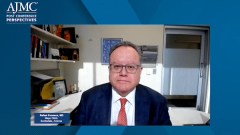
Optimizing Bispecific Use in Multiple Myeloma Treatment
A key opinion leader explores the integration of bispecifics into MM therapy regimens.
Episodes in this series

This is a video synopsis/summary of a Post Conference Perspectives featuring Rafael Fonseca, MD.
When using bispecific antibodies in multiple myeloma (MM), proper sequencing with chimeric antigen receptor (CAR) T-cell therapy is important since they can target similar antigens. CAR T-cell therapy may be favored earlier given the one-and-done appeal and quality of life benefits shown in studies like CARTITUDE-4 and KarMMa. Bispecifics are now better managed with less concern about cytokine release syndrome, even allowing outpatient administration at some centers, potentially expanding community hospital access beyond academic sites.
While bispecifics don’t match CAR T-cell therapy response rates, their wider eligibility makes them an exciting option. They will also likely expand into solid tumors. However, infections remain a key long-term toxicity that requires prevention/proactive management with IgG replacement and antibiotics. Understanding optimal dosing and schedules for antibodies like talquetamab will also minimize cumulative toxicities like rash and weight loss that can impact quality of life. But with proper mitigation strategies, bispecifics have a promising future in myeloma.
Video synopsis is AI-generated and reviewed by AJMC® editorial staff.
Newsletter
Stay ahead of policy, cost, and value—subscribe to AJMC for expert insights at the intersection of clinical care and health economics.










